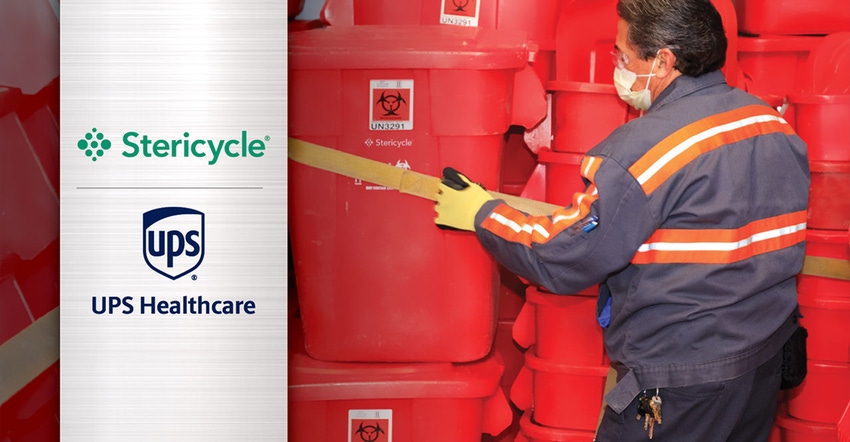
Stericycle and UPS Healthcare have entered a partnership to manage the reverse logistics of medical waste.
As a result of the partnership, the transportation, treatment, and disposal of a number of medical waste types including biohazardous, sharps, and pharmaceutical wastes will be transported, treated and disposed of. Types of waste depend upon what is generated, but can include wabs, sharps, gauze, and, in some cases, personal protective equipment (PPE), according to the companies.
Waste360 recently questioned Cory White, EVP and chief commercial officer, Stericycle and Wes Wheeler, president, UPS Healthcare, about the endeavor.
Waste360: Please tell me about how the partnership came to fruition. What issues were both UPS and Stericycle looking to solve?
Cory White: Healthcare is a dynamic industry; it is constantly changing as new modalities, treatments, and technologies are discovered. One trend, that was further accelerated by COVID-19, is the delivery of healthcare moving from inpatient to outpatient facilities. There has been an increase in volume in patient care provided in ambulatory surgery centers, primary care clinics, retail clinics, urgent care centers, nurse-managed health centers, emergency departments, retail clinics, and patients’ homes.
Wes Wheeler: UPS Healthcare has been supporting the healthcare industry for years, providing customers with world-class services, including inventory management, temperature-controlled packaging and shipping, storage and fulfillment of pharmaceuticals, medical devices, labs, and clinical trial logistics. The one area of the healthcare logistics chain that was missing was the reverse logistics for the responsible disposal of the medical waste once it was used.
To help solve this missing link, UPS Healthcare engaged Stericycle, who has a very strong record in the reverse logistics of medical waste. Now, through this partnership, we will be able to provide full end-to-end logistical support to the healthcare industry – not only delivering critical healthcare packages to organizations and customers globally, but also connecting partners to responsibly manage the disposal of medical waste after care and therapies have been provided to patients.
Waste360: What challenges will this solve for the proper disposal of medical waste?
White: Proper medical waste disposal is an essential service that mitigates the spread of infection, protects healthcare workers and communities, protects our waste workers, and helps doctors and nurses across the country focus on caring for those who have fallen ill. With over 30 years of expertise, Stericycle has provided a suite of safe and reliable solutions serving hospitals, healthcare facilities, and commercial businesses of every size. As the industry leader in this space, our existing national footprint of 50 processing facilities, 100 transfer sites, and more than 900 permitted medical waste trucks positions us well to support healthcare organizations with the proper treatment and disposal of medical waste. Together, this strategic partnership can ensure the on-time delivery and responsible disposal of life-changing drugs, therapies, and medical supplies. We’re increasing each other’s access to the locations where healthcare is happening – ensuring we’re able to share our expertise more widely.
Waste360: As restrictions loosen from the pandemic, how will this aid in supporting the medical supply chain?
White: The healthcare industry was already undergoing widespread transformation before the pandemic hit. COVID-19 just further accelerated changes already afoot in healthcare, such as a rise in telemedicine and a more distributed healthcare model. Just as similar public health crises have in the past, the pandemic exposed a broad need for business models that are more resilient in the face of change and more fluid in terms of operations.
Stericycle and UPS Healthcare leveraged their existing expertise and partnered to provide end-to-end support of the healthcare industry. This partnership helps take an emerging model of delivering healthcare outside of a hospital setting to the next level. Medical waste is a byproduct of healthcare, at any location.
Waste360: How will UPS connect its partners with Stericycle to responsibly manage the disposal of medical waste?
Wheeler: UPS Healthcare is a longstanding provider of supply chain services for many of the world’s leading healthcare companies and the company is continually looking to support new customers. Through the partnership with Stericycle, UPS Healthcare will look to introduce existing and new partners to Stericycle, letting them know that UPS can be a resource to manage all logistics – whether it’s through us or a trusted partner.
About the Author(s)
You May Also Like




